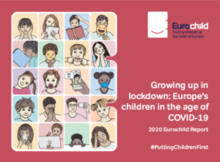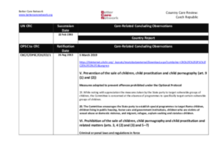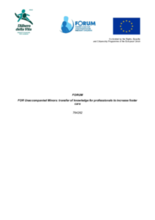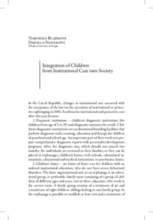Displaying 11 - 20 of 35
This report reflects on the effects of the coronavirus pandemic on children. It compiles information gathered from 25 countries across Europe, and provides recommendations for improving public policies in the short and long-term to support better outcomes for children and families, including children in alternative care or at risk of separation.
A cross-sectional survey was undertaken to estimate the prevalence of child maltreatment and adverse childhood experiences in the Czech Republic, as data on these is scarce.
Join this webinar to walk through the PROMISE Child Participation Tool and to discuss approaches and considerations for soliciting children’s views on their Barnahus experience.
The purpose of this webinar is to shed light on the specific experiences and issues of unaccompanied and separate girls in the European Response.
This country care review includes the care-related Concluding Observations adopted by the Committee on the Rights of the Child and the Committee on the Rights of Persons with Disabilities. The Committees' recommendations on the issues relevant to children's care are highlighted, as well as other care-related concluding observations, ratification dates, and links to the Universal Periodic Review and Hague Intercountry Adoption Country Profile.
This article is written as part of the FORUM project (FOR Unaccompanied Minors: transfer of knowledge for professionals to increase foster care), an EU funded project which sought to enhance the capacity of professionals to provide quality foster care for unaccompanied migrant children, primarily through the transfer of knowledge. The article aims to contribute to this transfer of knowledge by bringing together literature which is of relevance to professionals developing or enhancing foster care services for unaccompanied migrant children.
The theme of this year's ISPCAN Congress, to be held in Prague, Czech Republic 2-5 September 2018, is "Child Protection in the Changing World."
The aim of the article is to describe the system of the substitute family care in the Czech Republic and to introduce a foster care as one of the institutes of the substitute family care.
This article describes the changes in institutional care in the Czech Republic that were ushered in with the acceptance of the law on the execution of institutional or protective upbringing in 2002.
The objective of this essay is to determine how substitute child care in the Czech Republic has changed in the last ten years.





